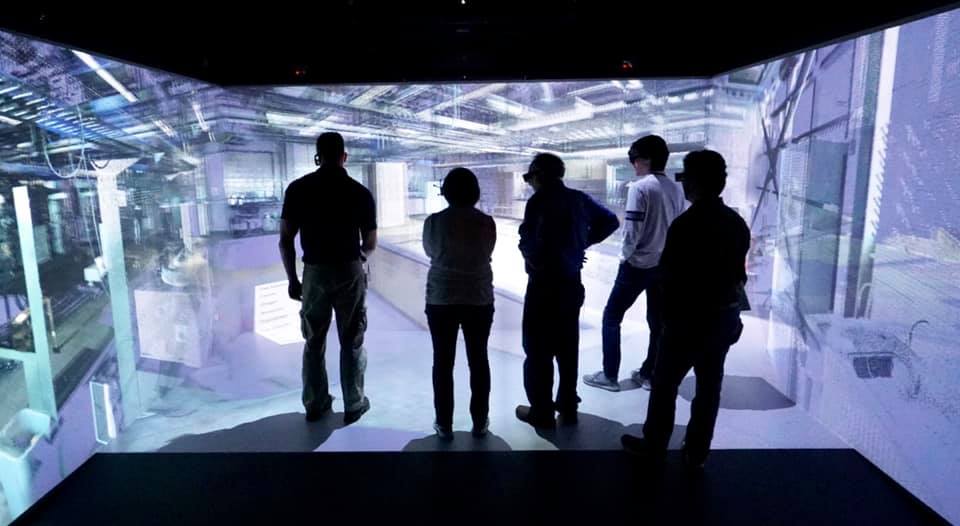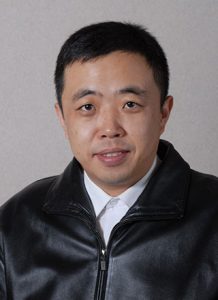February 08, 2021

Imagine studying a protein by walking through its three-dimensional structure. Or researching traffic patterns by standing alongside a virtual highway. Or safely exploring the structural integrity of a house while it’s on fire. Mizzou Engineers will soon have the capability to do these things, thanks to a CAVE opening this year in Lafferre Hall.
A CAVE is a small facility that provides users with an immersive virtual environment. It consists of adjustable walls, a floor and motion sensors that track movement. Unlike other types of virtual reality, users do not have to wear bulky headsets to experience their 3D surroundings.
The National Science Foundation recently awarded a team of Mizzou Engineers a grant to purchase and implement the CAVE. It will be the only one of its kind in Missouri and one of few in the Midwest, said Ye Duan, associate professor of electrical engineering and computer science.

“The CAVE has a lot of possibilities to test hypotheses in lifelike environments without the dangers or risks,” he said. “We are excited to bring it to campus. There are a lot of opportunities for collaboration not only across Mizzou but also across the state.”
Duan is principal investigator (PI) for the grant. He and the project team are setting the facility up this semester and plan to begin pilot projects this summer. They expect it to be fully operational in the fall.
Projects in the Works
Already, faculty from Mizzou Engineering and other colleges are working on projects for the CAVE.
Several EECS professors are planning to use it to further their research on protein structures. Other EECS faculty will simulate disaster scenarios to study first responders’ decision-making process in real time. Civil engineering faculty plan to use the CAVE for infrastructure design and work zone safety research.
“This is interesting visualization technology,” said Kannappan Palaniappan, EECS professor, and a Co-PI of the project. “It’s been around for a while but not in a way that’s been accessible. We’re now on the cusp of a major revolution when it comes to virtual and augmented reality, teleoperated and autonomous systems and this will allow students to really get hands-on experience in collaborative immersive simulation and modeling environments.”
Duan also envisions outside groups such as fire and police departments using it for training. And the team is planning to host demonstrations of the technology for schools and community organizations.
A Headset-Free VR Experience
What makes the CAVE advantageous is that it does not require headsets. That means those using the facility are able to see themselves and those around them within the virtual environment.
“VR headsets are immersive but limiting in terms of the things you are able to do,” said Prasad Calyam, associate professor in EECS and a Co-PI of the project, “There are cyber sickness issues associated with the headsets and limitations to the displays.”
VR headsets can cause neck fatigue and eye strain as the field of view is narrower than human vision.
The goggle-free environment will allow researchers to observe those using the technology. Those studying the CAVE will be able to see how a person is responding to their virtual surroundings, including observing upper facial expressions.
Calyam is also the Director of the Cyber Education, Research and Infrastructure (CERI) Center, where the CAVE will be located as a managed service for researchers and educators.
The CAVE system will be integrated into at least 10 courses at Mizzou, reaching more than 200 students a year.
An Interdisciplinary Team
The team working on CAVE projects includes researchers from across Mizzou Engineering, as well as faculty from other colleges.
Other team members on the project include:
- Joi Moore, professor and associate dean for engagement and outreach in the College of Education;
- Bimal Balakrishnan, associate professor and department chair of architectural studies in the College of Human Environmental Services;
- Jianlin Cheng, EECS professor;
- Praveen Edara, chair of Civil and Environment Engineering
- Zhihai He, EECS professor;
- Isa Kim Jahnke, associate professor in the School of Information Science & Learning Technologies in the College of Education, director of the Information Experience Lab;
- Jong Bum Jung, assistant professor in the department of architectural studies;
- Chi-Ren Shyu, EECS professor and director of the MU Institute for Data Science & Informatics;
- Carlos Sun, professor of Civil and Environmental Engineering;
- Fang Wang, assistant teaching professor of Information Technology;
- Dong Xu, Shumaker Endowed professor in EECS;
- Xinhao Xu, assistant professor in the School of Information Science & Learning Technologies; and
- Xiaoqin Zou, professor of physics and biochemistry and PI of the Zou Lab.